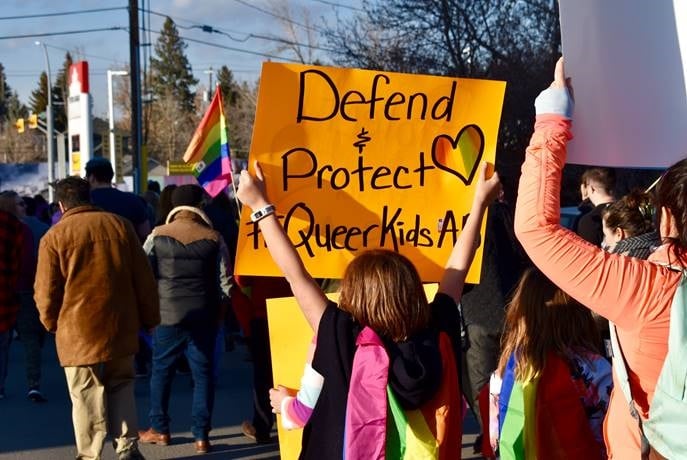
Melanie Judge and Christi van der Westhuizen write after an ordeal at a fine-dining establishment on the Garden Route that because a place doesn't directly say "no queers here", it doesn't mean their conduct won't communicate that very sentiment.
An incident on a recent trip up the Garden Route requires a pause to reflect on the continuing power of unspoken prejudice in South African life, particularly during international Pride month.
The Equality Court provides some recourse for this, but how do we tackle forms of exclusion and marginalisation in our daily lives that are enacted through omission rather than commission?
To briefly describe what happened, we marked a special occasion by having dinner at an internationally awarded restaurant in a coastal town on the Garden Route. The evening turned into a blunt reminder of the enduring cultures of bigotry that permeate many spaces in South Africa, including in leafy hamlets where money does not buy equal treatment.
Over the years, significant activism and research have focused on various forms of discrimination against LGBTI people in South Africa, including manifestations in violence and hate speech. Even as such attacks on the rights and dignity of queers increasingly gain public acknowledgement, the more covert or unspoken forms of exclusion often remain overlooked.
Bigotry
But these "subtle" exclusions are fundamental to creating and maintaining cultures of prejudice, inequality and stigmatisation, which allow the more pernicious forms of exclusion to continue unabated. Our experience at said restaurant is a case in point, also in showing that such cultures permeate all corners of South African society. It confirms that a discourse that suggests that bigotry is confined to poorer or so-called "uneducated" sections of the population is false, noting too that the forms it takes may differ from context to context and are shaped by historical patterns of racial inequality.
As customary in fine-dining restaurants, the chef does a round to all tables at the end of the evening, to inquire about the food and wax lyrical about their trade. In an intimate room of five tables, it was quite clear that the chef (and owner in this case) chose to ignore us entirely, which was in stark contrast to her excited and lengthy engagement with all the other guests.
Paradoxically, we were noticeably being made invisible by her conduct, which was underlined by that of her husband who, despite being "front of house", also avoided engaging with us.
READ | Umlilo's new documentary shines spotlight on queer people's reality
This silencing encounter caused us extreme discomfort. The following day, we raised the concern with the chef, asking: in the absence of any other plausible explanation, was the behaviour aimed at insulting us as a same-sex couple?
Her response was again avoidant and dismissive, this time circumventing any attempt to ease our distress by shifting the blame for our discomfort back onto us. She implied that avoiding us was out of respect for our "privacy".
Our earlier decline to join other mask-less guests in a small room without social distancing for pre-dinner drinks was proffered by her as us requiring "privacy". Compliance with Covid regulations is for another day but is also certainly no private matter.
The realm of the private
Commonplace representations of queer sexuality as the realm of "the private" rely on the age-old trope of "the love that dare not speak its name". This is about positioning queers as shameful persons who should be hidden, and certainly not be making any claims on the public or on public expression itself.
This trope is mainly deployed against lesbians for, in a notion that continues from the Victorian era, our sexuality is deemed "impossible". As we have experienced throughout our own lives, lesbians are subject to erasure because they are placed outside of the heteronormative order through the withdrawal of social recognition. This is because the lesbian disturbs the fantasy of heterosexual wholeness and impenetrability (and perhaps evokes a few new fantasies too).
But, as an out lesbian couple, our identities are as much about the private as the public. Accountability for the legally enshrined principles of non-discrimination, equality and dignity holds true for both spheres.
READ | Hoerskool DF Malan accused of homophobia after it bans 'Pride month' sit-in by pupils
Just as a Mom-and-Pop restaurant may assert the hetero-coupling that drives it, its clientele must be afforded the same privilege. Equal treatment on the basis of race, sexuality and gender is not a private matter. It is a public imperative.
In such a moment, class is no shield. Some may say our whiteness would guarantee equal treatment, but this is not always so. Covert forms of stigma, marginalisation and exclusion are present in all spheres of queer life in South Africa: in rural towns and cities, townships and suburbs. At the same time, racism further enables the precarity that black queers face.
Denying the presence of the queer body
Exclusion and marginalisation based on race is also a daily occurrence in South Africa and can similarly be enacted through avoidance and omission as well as through direct attack and commission. Racism works to keep spaces white, and thereby to keep racial hierarchies intact.
Likewise, heterosexist spaces are produced by denying the presence (and therefore existence) of the queer body. Heteronormativity props up race: to make an all-white space hostile to sexual others is to affirm whiteness as "naturally" heterosexual.
Forms of prejudice that are expressed through omission, rather than commission, can easily slip through the accountability cracks precisely because they are difficult to "evidence" in a more formalistic way. Simply put, just because someone doesn't say directly "no queers here" doesn't mean their conduct won't communicate that very sentiment.
This slippage leaves us with a necessity to act, in as far as we are able, against these more insidious cultures and practices of exclusion that still characterise all levels of society. It asks of us to call out prejudice by omission, and in so doing, to put shame back where it belongs.
- Judge is a queer activist and author of 'Blackwashing Homophobia: Violence and the Politics of Sexuality, Gender and Race', and Van der Westhuizen is a feminist whiteness scholar and author of 'Sitting Pretty – White Afrikaans Women in Postapartheid South Africa'.
To receive Opinions Weekly, sign up for the newsletter here. Now available to all News24 readers.
Disclaimer: News24 encourages freedom of speech and the expression of diverse views. The views of columnists published on News24 are therefore their own and do not necessarily represent the views of News24.




 Publications
Publications
 Partners
Partners























